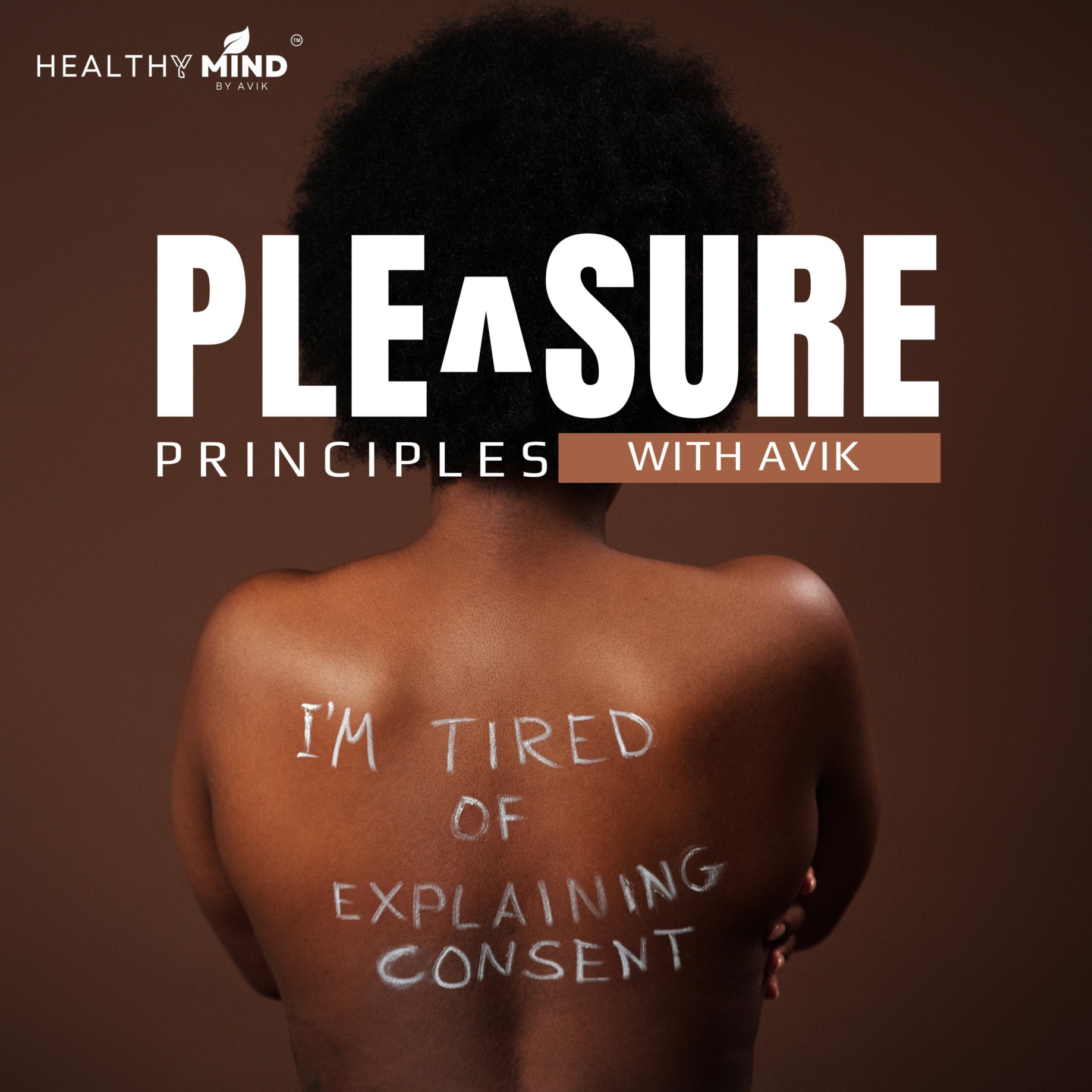.jpg)
Mind Over Masculinity
Let’s stop asking men to "man up" and start asking how we can lift them up. After all, mental health is not just a women’s issue or a men’s issue—it’s a human issue.
Take the first step today. Talk, listen, and advocate. Together, we can make a difference.
Mind Over Masculinity
Rewriting Your Narrative: Embracing Creative Control and Personal Empowerment for Transformative Life Changes with Steve Gallegos
Step into the director's seat of your life with the wisdom of Steve Gallegos, America's Ambassador for Success. What if you could rewrite the script of your own story and break free from roles that no longer serve you? Steve joins us to share his transformative insights on taking creative control of our narratives and the power of yelling "cut" when something in our lives needs to change. He draws compelling parallels between directing a film and shaping our life's journey, urging us to take responsibility for our paths and craft the stories we truly wish to live. Get ready to explore how awareness and a shift in perspective can lead to profound personal change.
In this enlightening episode, we challenge you to break free from the confines of self-limiting beliefs and societal narratives that have been cast upon you. Through personal anecdotes, we highlight the courage required to shed these external influences and step into a life that is authentically your own. Are you living out a role assigned by others, or are you the author of your own empowerment and authenticity? Join us as we explore the necessity of evaluating our roles and taking the bold leap into the unknown to create a life story that is uniquely ours. Steve's journey and insights are sure to inspire you to examine your life and begin the process of writing your own narrative.
Automate Social Media Post
Make Short Clips From Long Videos
Loved by 4M+ marketers, entrepreneurs & creators
Create and translate videos
Create and translate videos with HeyGen's AI Video Generator
Buzzsprout Podcasting
Disclaimer: This post contains affiliate links. If you make a purchase, I may receive a commission at no extra cost to you.
-----------------------------------------------------------------------------------------------------------------
Want to be a guest on Mind Over Masculinity? Send me a message.
-----------------------------------------------------------------------------------------------------------------
Stay Tuned And Follow Us!
- YouTube - https://www.youtube.com/@healthymind-healthylife
- Instagram - https://www.instagram.com/podhealth.club/
- Threads - https://www.threads.net/@podhealth.club
- Facebook - https://www.facebook.com/podcast.healthymind
- LinkedIn - https://www.linkedin.com/in/newandnew/
Hey everyone, welcome back to Mind Over Masculinity, the podcast where we break down the walls of outdated stereotypes, embrace the vulnerability and redefine strength on our tongues. Today we are going to dive headfirst into the stories that we tell ourselves, the ones that hold us back, push us forward and sometimes keep us stuck in the roles that we didn't even audition for. And who better to guide us through this transformative conversation than my guest today, the one and only Steve Gallegos. So welcome to the show, Steve.
Speaker 2:Thank you, avik. It's a pleasure to be here, especially knowing that it's midnight for you in your beautiful country where you're at, so you're up late conducting these interviews. That's exciting.
Speaker 1:I'm really happy you so much, and today's topic is very great and I can't wait to discuss about this. But before we delve deep into it, I'd quickly love to introduce you first to all the listeners. Dear listeners, steve, they everyone call him as america's ambassador for the success, america's ambassador on success, and trust me, once you hear his story, you will know why he is known as the america's ambassador on success. So they listen like he is like the ultimate blockbuster movie. Us Marine surgeon, law enforcement officer, singer, songwriter, recording artist, trial lawyer, photographer, speaker, author. I mean I have to. I mean, I mean I have nothing to say. I mean you can understand with whom we have the show today. And, steve, did I miss anything?
Speaker 2:uh, no, you. Well, I am a husband to a beautiful wife.
Speaker 1:Yes, agreed, agreed, okay, okay. And then, dear listeners, oh, the spoiler alert. He convinced the President of the United States to help him become the US citizen. Yes, no big deal, right.
Speaker 2:No.
Speaker 1:But here's the thing is, steve isn't here to just flex his resume, but he's here to help us rewrite ours as well, our life's emotional resume. Uh, I mean, he he's all about teaching us how to, I mean how to yell cut, cut on the roles that we have been playing for too long and step into the writer's chair of your own story. So his upcoming book, unshackled for Women, ready to Yell Cut, is already creating the babes, and he's here to share some of that magic with us. So I'll not speak much. I'll quickly start and open the show for one and only Steve. Welcome to the show.
Speaker 2:Thank you, avik. It's a pleasure to be here with you and your audience and to help everybody yell cut, because we can all do it.
Speaker 1:Yes, exactly so. Most people think of their life story as something that happens to them and all, but you have a completely different take. I mean, you say that we are all the writers, producers and the directors of our own story, which I also believe. That's very true. But what's the first step someone can take to reclaim that creative control?
Speaker 2:That's a very good question, avik. And before I answer that question, if I may, you know life. We don't live in a bubble, right? Nobody lives in a bubble. Sometimes we like to think we do, but the fact is that life is there for us to experience and as we experience life, there are just so many signs and so many of your audience and people around the world. They're just drawn to, they're fascinated by the stories of the actors and actresses and the people that are on the screen, and the musicians, the singers and the dancers and the artists that we see on the silver screen or on our television. And we're just so fascinated and many times we think I could never be like this person. But the thing that we need to realize is that these people are there for us, many of them. Yes, they're there for themselves. They're all about me, me, me, me, me, but the truth is that they are there of.
Speaker 2:Your story came to me from the entertainment industry. Whenever you watch a good movie, if you've ever seen the background, the behind the scenes of any movie, sometimes you'll see the director say cut. And the reason they do that is because the actors on the screen are not doing the things that they're supposed to be doing, maybe they forget their lines, maybe they're not behaving in a way that is correspondent to the script, and so the director he's the one with the vision, or she's the one with the vision, she's the one with the ultimate responsibility for the outcome of this film. Whether or not that film or it could be a theatrical show on stage, or it could be a musical concert, it could be a record right or a recording that a singer is creating in the studio the director of that project is ultimately responsible for its success, and they're the ones with the authority to yell, cut, and what happens is they call the actors over and says no, you're reading that line incorrectly, your body language is incorrect, it's not congruent with what we're wanting to display from the script. And so the director is the one that makes changes.
Speaker 2:And so I thought we can be the directors in our own lives. So, to answer your question, avik, what is the first thing that we need to do? The first thing we need to do is become aware, become aware that not only that we want to make a change, not only that there's something in our life that needs changing. It could be in our career, our job, our parenting skills, our intimate relationships with another person Anything about our lives that is not going the way that we want it to. This is where we become the director. We put the director's cap on and we say cut. And then we call everybody over, we start looking at all the elements and saying this person needs to be fired, this person could be replaced, this person needs to be re-instructed on what their role is in my life.
Speaker 2:Because this is the story of my life. This is my movie. I'm in charge of this. This is my movie. I'm in charge of this. I'm in charge of how my kids are going to turn out. I'm in charge of how my career is going to turn out. I'm in charge of how much money I'm going to make, where I'm going to live, how I'm going to dress, where I'm going to travel, where I'm going to vacation, all of these things. And so once you become aware that you are the director and that you have 100% sole responsibility for the outcome of every element of your life, that's when you sit down and you yell cut wow, what a lovely explanation.
Speaker 1:I would say. I mean it's really really way. I'm really happy that you mentioned all of this so minutely. I mean that is really really great. Yeah, that's really great. And um, also, like when you mentioned about this one more thing, like, let's say, someone has started to rewrite their story and, uh, but they keep hearing that little voice in their head that the one is saying, like, who are you to do this? Or I mean um kind of uh, how do you silence that inner critic? I mean it happens right.
Speaker 2:Oh yeah, and it happens to me, it happens to everyone, okay, so recognize that. So that little voice lives with all of us, right? But let's understand where that little voice comes from. Did you know, avik, that prior to the age of seven years old, we are living as children, we are living in a theta state. That means that our minds are receiving input, they're receiving information. It's kind of like being in a hypnosis state. In fact, theta is a hypnosis state. In fact, theta is the hypnosis state. So when we're in Theta, we're receiving a download of information.
Speaker 2:And prior to seven years old, who are we living with? We're living with our parents, mostly. And so when we see, when we hear, when we feel our parents react to the world, to each other right, mother, father, how they react to each other, brothers and sisters, grandparents, if they live with us, if we spend any time with them, all of the adults in our lives are reacting to the world. They're getting angry, they're getting upset, they're being joyful, they're being happy, and so we as kids are learning. This is my response to that external stimulus from the world. When something goes wrong, if our parents get angry and upset and violent, that's how we're going to behave, because it's our learned stimulus, it's our learned response. And so by the time we're seven years old, after seven years old, that's when we start using our analysis, we start making our own minds up, we start looking at the information coming in, we start saying I like this, I don't like this. But our reaction, our response to each of those stimulus is what we were taught prior to the age of seven. And it's not until we grow up and become adults that we learn that much of our behaviors, much of the way that we behave with other people or the way we behave at work, or the way that we behave with our friends when we're out, you know, celebrating or having a party or something, is from our childhood.
Speaker 2:And it's from that childhood that we got that little voice, because it's our parents. When we told our parents, I remember when I told my parents what I wanted to do, you know, as a little kid I wanted to be a fireman, I wanted to be an astronaut, I wanted to be the president of the world and all of these great things. And you know, sometimes our parents said, oh, aren't you cute, right? But the older you get, they start saying you're so stupid you can't even pass math in school. You can't even multiply three times three, right? Your grades are awful. Who do you think you are? Get your head on straight, stop dreaming and go do what you're supposed to do. Come home with A's. Come home with good grades, right?
Speaker 2:And so all of this programming is that little voice. You're stupid, you're not tall enough, you're not pretty enough, you're too fat, you're too thin, you're not educated enough, you don't have any money. You were born on the wrong side of the tracks, you don't have the right name, you don't have any resources, you're not connected, you don't know the right people, right. All of these things, excuse me. That's what guides us. When we try, then, to do something big, to do something good, to say you know what? I'm going to go to school and become a doctor, that little voice comes in. You're too stupid. You barely graduated high school. Are you going to become a doctor? Right.
Speaker 2:And so what we need to do is learn that where that voice comes from is not us. That little voice used to protect us back in the day, right, when we wanted to jump off a bridge. Right. That little voice would come and say uh-uh, don't jump off that bridge because you're going to break your legs. Okay, that voice is there to protect us.
Speaker 2:But if we don't know when to tell that voice, okay, I don't need you anymore. Thank you for all of these years of protection and guidance, but I don't need you anymore because right now, I'm going to become a doctor, I'm going to become a lawyer, I'm going to become a film producer, I'm going to become a recording artist, I'm going to paint this beautiful painting and it's going to hang in a popular museum right, all of these wonderful things that we want to do. We need to just recognize that little voice is going to show up and we need to be aware and say, okay, little voice, you can name it. Some people call it a monkey, some people call it a monkey brain, some people call it george or bob, whatever you want to call it right and just say okay, bob, be quiet. Right, I'm doing this now.
Speaker 1:Yeah, Understood, Understood and okay. And one more thing is like, you often talk about the stories that we tell ourselves and how they can either empower us or maybe imprison us. So how do we start identifying which stories are holding us back?
Speaker 2:Oh, that's another great question. Which stories are pulling us down? Well, all you need to do is look at your life, look at your life situation right now, today, this very moment. Look at everything you have, look at everything you think you are, look at where you work, look at where you live, look at who you spend your time with, look at what you eat, look at how you feel and, if anything Avik, if any of those elements are not satisfactory to you, that means that there's something in your life that needs to change. Something is not working. There's something in your life that needs to change. Something is not working.
Speaker 2:So then we look back to determine where that story came from. Let's say that someone is dissatisfied with the way they look. They're too heavy because they like to eat. They really enjoy food, right, but they enjoy the wrong foods. It's okay to enjoy food, right. I love food, food for me, and gathering my family and friends around the table and having food and and just enjoying conversation. That is like a really good time for us. But it's not going to work if we're constantly eating the wrong foods. Now, what is the wrong food? Well, that depends on you and your lifestyle and your culture, right, what what's working in your body is. If something that you eat makes you feel energized and alive and good, then, yes, keep eating it. But if you eat something and within minutes, you're feeling like you want to take a nap for the rest of your life, it's probably not a very healthy food for you, right? Not a very healthy food for you, right? And so if we look at that situation in our life and say, okay, my story is that I've always been fat. Where does that come from? Well, my parents used to tell me I'm fat. My parents used to call me fat. So and this is a true story, this is my parents used to tell me I was too fat, and I don't, you know, looking back at my childhood pictures, I wasn't fat at all, right, I was muscular and I was a good looking kid, but I believe that I was the Goodyear blimp. I don't know if you and your audience recognize what the Goodyear blimp is. It's a big a vessel that flies in the air very, very slowly, usually above sports games and those kinds of things, and it contains cameras to shoot down, to take pictures of what's going down below. So that's and Goodyear is a brand here very well known in America, and so it's called the Goodyear Blimp. It's a big vessel, it's a big balloon, is what it is, and I used to think that I was like a Goodyear blimp.
Speaker 2:I used to be afraid of eating in front of other people when I was in school, during lunch, right in middle school, grade school and even in high school. If I was eating, and especially if a girl came and sat down at my table with me, somebody that I knew I would stop eating. Why? Because I was listening to that little voice You're fat. She's going to think you're fat. She's going to think you eat like a little pig.
Speaker 2:And even though I was eating normal right, and so that was my story, I believed that story and it wasn't until I realized that that story didn't come from me. It came from somebody else's opinion about me and I believed it. So I needed to take control and stop believing that story. I needed to recognize that that story is from someone else their vision of me, their desire for me, their view of me, which is completely wrong, because my view of myself is lean, athletic, muscular, fit, and so if I want to promote which story, which story do I want to promote which story? Which story do I want to promote? Do I want to promote the story that other people have told me that I'm fat or do I want to promote the story that I want to believe about myself, that I'm healthy, that I'm fit, that I'm flexible, that I'm muscular, that I'm lean? So you need to decide which story you want to promote, which story you want to tell.
Speaker 2:And I think one of the reasons that people have such a hard time letting go of their stories is because they get so much from telling the story. And what I mean by this is there's many people in our audience that believe something about themselves. Let's say, they believe that they lack education and therefore that they can't succeed at work or in business. And so they tell themselves I've never been good at business, I've always failed, I didn't do good at school, et cetera, et cetera, et cetera All of the reasons why they can't succeed in business or get promoted at work. Well, if they keep believing that story, they're going to keep getting the same result.
Speaker 2:And one of the reasons is they keep believing that story is because every time they tell that story, what happens is people go oh Steve, I'm so sorry, right, and they give me a hug and they pat me on the back or you know, I get attention when I tell my sad story. So we need to recognize the reason I'm telling this story is because I'm getting attention. Ah, it's not because the story is true. It's because we keep telling the story in order to get something right. If we keep telling the story of I'm hungry, people are going to feed you, you keep telling the story that you're a victim, people are going to pity you and be sad and they're going to hug you and they're going to say oh, you're so, whatever, right. And in many cases people live for that kind of response from someone else. And so it's not until we let go of the story.
Speaker 2:And this is where people have a hard time. If I let go of the story, who will I become? They don't know. It's scary. It's much easier to say they don't know it's scary. It's much easier to say I'm a victim. This is what I know and this is why we repeatedly get into bad relationships where we're abused and criticized and made fun of and not supported, because it's all we know. But if we let go of that person, if we let go of that identity of ourselves. We're scared. What's going to happen? What's on the other side of that? No, no, no, no, no, no. That's too scary for me. The unknown is more scary, so let me just stay where at least I know what to expect Makes sense.
Speaker 1:Yes, definitely, definitely makes sense. Lovely, I mean sense, lovely, I mean, steve. I mean this conversation has been like a masterclass in breaking free from the script that we didn't write and stepping into the role of a creator. I mean I can definitely continue our conversation but I know the time is constrained but I believe listeners gonna is constrained, but I believe listeners are going to resonate with the discussions we had today and it is very important and thank you for shedding light on it and definitely have given us so much to think about, like from challenging limiting beliefs to rewriting our stories with the intention. So, for everyone who's listening, here's your challenge. Like this week, ask yourself one big question, like are you playing a role that someone else cast for you or you are writing a life that's authentic and true to you?
Speaker 2:Try this, why not? That's a beautiful challenge question. That's excellent.
Speaker 1:Yeah, yeah, and I mean, steve, like you have shown us that it's never too late, never too early and never too impossible to yell, cut and start fresh.
Speaker 2:Absolutely.
Speaker 1:Yeah, thank you so much for being here and for all the listeners. If this episode has inspired you, share it with a friend, family member or someone who needs to hear it and hit that follow button, leave us a review and connect with us on social media. Also, I'll put all the links about Steve into the show notes so that you can easily reach out to him. You can know more about him and definitely comment about this challenge which we shared. So remember that the best stories are the ones you write yourself, and let's start creating them and see you next time. So


.jpg)




